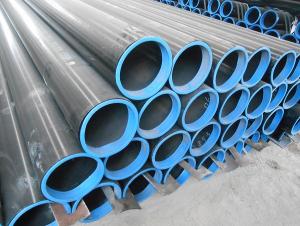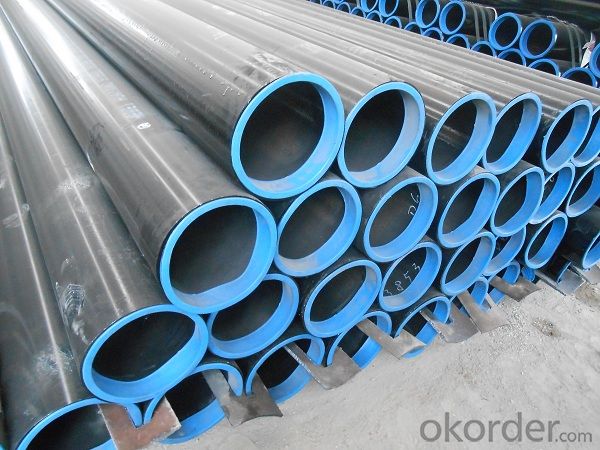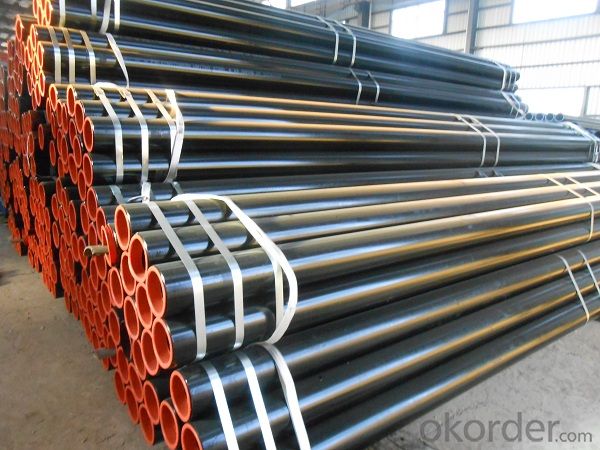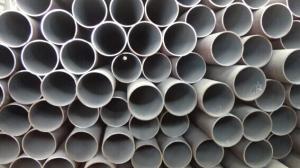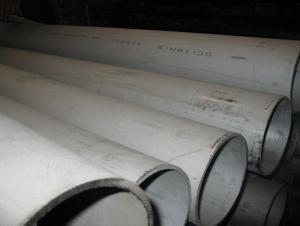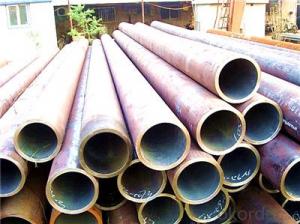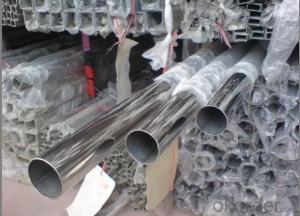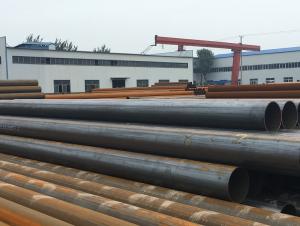Seamless steel pipe a variety of high quality ASTM
- Loading Port:
- Tianjin
- Payment Terms:
- TT OR LC
- Min Order Qty:
- 35 m.t.
- Supply Capability:
- 20000 m.t./month
OKorder Service Pledge
OKorder Financial Service
You Might Also Like
1、Structure of
Seamless steel pipe a variety of high quality ASTM
Seamless pipe is formed by drawing a solid billet over a piercing rod to create the hollow shell. As the manufacturing process does not include any welding, seamless pipes are perceived to be stronger and more reliable. Historically seamless pipe was regarded as withstanding pressure better than other types, and was often more easily available than welded pipe.
2、Main Features ofSeamless steel pipe a variety of high quality ASTM
• High manufacturing accuracy
• High strength
• Small inertia resistance
• Strong heat dissipation ability
• Good visual effect
• Reasonable price
3、Seamless steel pipe a variety of high quality ASTM Specification:
Standard | GB, DIN, ASTM ASTM A106-2006, ASTM A53-2007 |
Grade | 10#-45#, 16Mn 10#, 20#, 45#, 16Mn |
Thickness | 8 - 33 mm |
Section Shape | Round |
Outer Diameter | 133 - 219 mm |
Place of Origin | Shandong, China (Mainland) |
Secondary Or Not | Non-secondary |
Application | Hydraulic Pipe |
Technique | Cold Drawn |
Certification | API |
Surface Treatment | factory state or painted black |
Special Pipe | API Pipe |
Alloy Or Not | Non-alloy |
Length | 5-12M |
Outer Diameter | 21.3-610mm |
Grade | 20#, 45#, Q345, API J55, API K55, API L80, API N80, API P110, A53B |
Standard | ASME, ASTM |
1) Material:20#(ASTM A 106/A53 GRB.API5LGRB,GB),45#,16Mn,10#.
2) Specification range:OD:21.3-610mm,WT:6-70mm,length:6-12m or according to the requirement of clients.
3) Excutive standards:GB,ASME API5L.ASTM A 106/A53,Despite of the above standards,we can also supply seamless steel pipe with standard of DIN,JIS,and so on,and also develop new products according to the requirements of our clients!
4) Surface:black lacquered,varnish coating or galvanized.
5) Ends:Beveled or square cut,plastic capped,painted.
6) Packing:bundles wrapped with strong steel strip,seaworthy packing.
4、Packaging & Delivery
Packaging Details: | seaworthy package,bundles wrapped with strong steel strip |
Delivery Detail: | 15-30days after received 30%TT |
5、FAQ of Seamless steel pipe a variety of high quality ASTM
①How is the quality of your products?
Our products are manufactured strictly according to national and internaional standard, and we take a test
on every pipe before delivered out. If you want see our quality certifications and all kinds of testing report, please just ask us for it.
Guaranteed: If products’ quality don’t accord to discription as we give or the promise before you place order, we promise 100% refund.
②How about price?
Yes, we are factory and be able to give you lowest price below market one, and we have a policy that “ for saving time and absolutely honest business attitude, we quote as lowest as possible for any customer, and discount can be given according to quantity”,if you like bargain and factory price is not low enough as you think, just don’t waste your time.Please trust the quotation we would give you, it is professional one.
③Why should you chose us?
Chose happens because of quality, then price, We can give you both.Additionally, we can also offer professional products inquiry, products knowledge train(for agents), smooth goods delivery, exellent customer solution proposals.Our service formula: good quality+good price+good service=customer’s trust
SGS test is available, customer inspection before shipping is welcome, third party inspection is no problem.
6、Seamless steel pipe a variety of high quality ASTM Images:
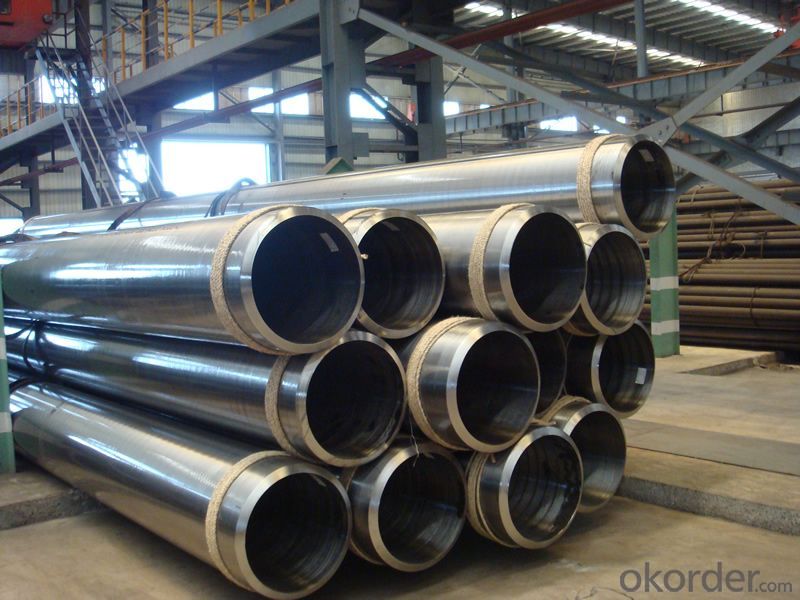
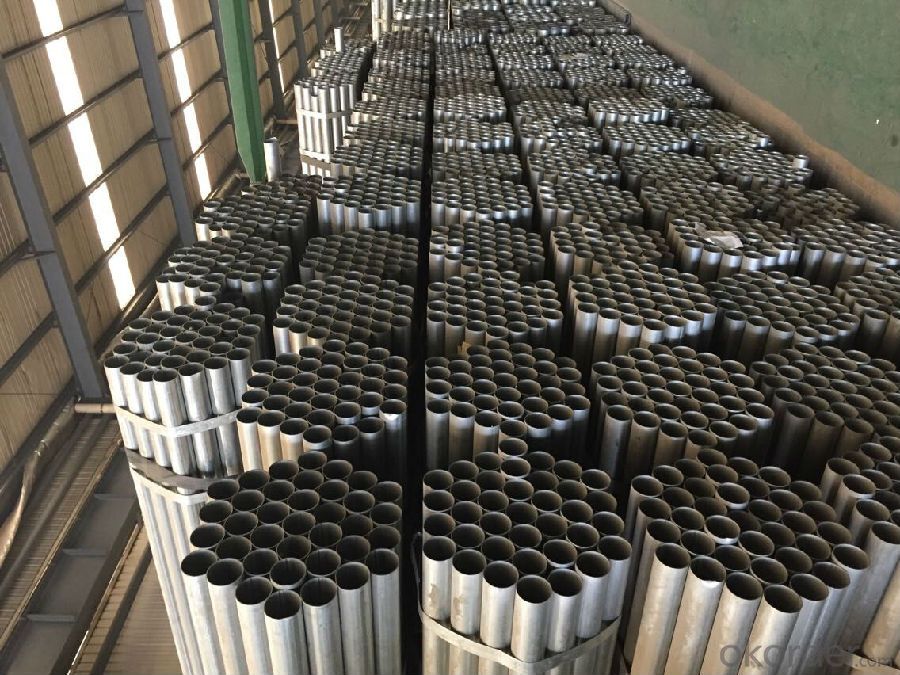
- Q: What are the different types of supports used for aboveground steel pipes?
- There are several types of supports used for aboveground steel pipes, including pipe hangers, pipe clamps, pipe shoes, and pipe saddles. These supports are designed to provide stability and prevent excessive movement or sagging of the pipes. They help distribute the weight of the pipes evenly and ensure proper alignment and support throughout their length.
- Q: How are steel pipes used in the construction of gas distribution networks?
- Steel pipes are commonly used in the construction of gas distribution networks due to their durability, strength, and ability to withstand high pressure. These pipes are used to transport natural gas from the source to homes, businesses, and industries. The steel pipes are laid underground and connected using fittings and valves to create a network that efficiently distributes gas. It ensures a safe and reliable delivery of gas to consumers while minimizing the risk of leaks or accidents.
- Q: Can steel pipes be used for underwater applications?
- Yes, steel pipes can be used for underwater applications as they are known for their high strength, durability, and corrosion resistance, making them suitable for various underwater environments and industries such as offshore oil and gas, marine construction, and underwater pipelines.
- Q: How to perform nondestructive inspection of steel tubes
- Including fluorescence, coloring two kinds. Because of its simple equipment and convenient operation, it is an effective method to check the surface defect of magnetic particle inspection. It is mainly used for surface defect inspection of non-magnetic materials.
- Q: What is the thermal expansion coefficient of steel pipes?
- The thermal expansion coefficient of steel pipes is typically around 0.000011 to 0.000012 per degree Celsius, which means that for every degree Celsius increase in temperature, the length of the steel pipe will expand by approximately 0.0011% to 0.0012%.
- Q: What are the common methods for joining steel pipes?
- The common methods for joining steel pipes include welding, threading, and using mechanical connectors such as couplings or flanges.
- Q: How do you calculate the maximum allowable deflection for steel pipes?
- When calculating the maximum allowable deflection for steel pipes, various factors must be taken into account. These factors include the pipe diameter, material properties, support conditions, and desired level of deflection. The maximum allowable deflection is typically determined according to industry standards and codes. One popular method for calculating the maximum allowable deflection is based on the pipe's span-to-diameter ratio, also known as the L/D ratio. The L/D ratio is calculated by dividing the pipe's span (the distance between supports) by its diameter. Numerous industry codes provide guidelines for the maximum allowable deflection based on the L/D ratio. For instance, the American Society of Mechanical Engineers (ASME) B31.1 Power Piping Code suggests that for carbon steel pipes, the maximum allowable deflection should not exceed 3% of the pipe's span when the L/D ratio is 100 or less. However, as the L/D ratio increases, the deflection limit decreases to ensure the pipe's stability and structural integrity. To calculate the maximum allowable deflection using the L/D ratio method, you first need to determine the L/D ratio based on the pipe's span and diameter. Then, you can refer to the applicable code or standard to find the corresponding maximum allowable deflection limit. It's important to note that other factors, such as the pipe material's yield strength, wall thickness, and the type of loading (e.g., dead load, live load), also influence the maximum allowable deflection. Therefore, it is crucial to consult the relevant industry standards, codes, and engineering principles to accurately calculate the maximum allowable deflection for steel pipes.
- Q: What is the difference between galvanized iron pipe and galvanized steel pipe? Or called different, in fact, is referred to as galvanized pipe?
- Seamless steel pipe material is steel, but also seamless, high strength, used in high pressure, harsh environment occasions. The galvanized pipe is only made on the steel tube, which is similar to the so-called antirust paint
- Q: How are steel tubes represented?
- If you speak of steel pipe, if it is water. Gas transmission pipe, then it is said: nominal diameter refers to the inner diameter. The units are millimeters or inches. [for example, water pipes with phi 25. It means that the nominal diameter (diameter) is 25mm (or an inch) steel pipe.
- Q: Are steel pipes suitable for use in food processing industries?
- Yes, steel pipes are suitable for use in food processing industries. They are highly durable, corrosion-resistant, and can withstand high temperatures and pressure. Additionally, steel pipes are easy to clean, maintain hygiene standards, and do not contaminate the food being processed.
Send your message to us
Seamless steel pipe a variety of high quality ASTM
- Loading Port:
- Tianjin
- Payment Terms:
- TT OR LC
- Min Order Qty:
- 35 m.t.
- Supply Capability:
- 20000 m.t./month
OKorder Service Pledge
OKorder Financial Service
Similar products
Hot products
Hot Searches
Related keywords
